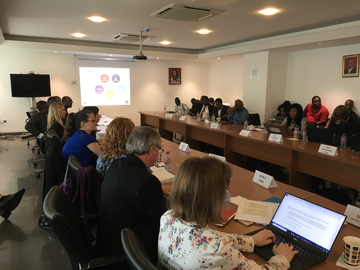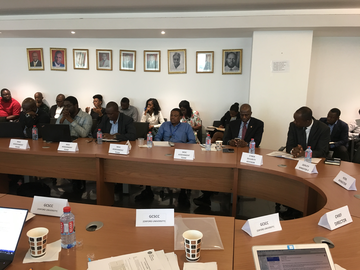Ghana
A Case Study in CMM Impact
Six years ago, in 2018, the GCSCC conducted a CMM review in Ghana at the invitation of the Ministry of Communications and Digitalisation. Partners for this assessment included the World Bank and KISA under the Korean-World Bank Partnership Facility, and the Norwegian Institute of International Affairs (NUPI). The CMM marked a pivotal moment in the country’s efforts to enhance its digital security infrastructure. Looking back, we can see that the findings from this assessment, in coordination with other capacity building investments, helped to facilitate a series of reforms and strategic investments that have since solidified Ghana’s standing as a regional cybersecurity leader.


Leveraging the CMM to Build a Strong Cybersecurity Framework
The CMM review placed Ghana in a "formative" stage, revealing that while significant groundwork had been laid, there was still much to do to create a robust cybersecurity ecosystem. Ghana’s government acted swiftly on the CMM recommendations, implementing reforms that have since transformed the country’s digital security landscape.
In the newly launched 2024 National Cybersecurity Policy & Strategy, the Ghanaian government stated that the CMM evidenced several key reforms that they have since implemented. These reforms were undertaken within a broader context of existing cybersecurity capacity-building already occurring in Ghana during this time and were made possible through investments by the World Bank and other international partners.
They included:
- Adopting the National Cybersecurity Institutional Framework (NCIF);
- Appointing a National Cybersecurity Advisor for the Ministry of Communications and Digitalisation;
- Undertaking capacity building training for law enforcement stakeholders under the GLACY+ Project;
- Establishing the National Cyber Security Inter-Ministerial Advisory Council (NCSIAC) and the National Cyber Security Technical Working Group (NCSTWG); and
- Creating the National Cyber Security Authority.
Ghana adopted the CMM to evaluate its cybersecurity maturity level and readiness, to guide strategic and enabling actions by the government to improve security and resilience of the country’s developing digital ecosystem.
Dr. Albert Antwi-Boasiako, Director General, Cyber Security Authority Ghana
Functioning as a Key Enabler for Future Success
These strategic reforms set the tone for a whole-of-government approach that has since been recognised as a key enabler of Ghana’s improved cyber resilience since 2017. In a 2023 Case Study in Strengthening Cyber Resilience by the World Bank highlighted the contribution the 2018 CMM had in facilitating broader reforms that led to a ‘whole-of-government governance architecture’ within Ghana. ‘From the President down to the operational level’, this architecture was credited by the study as having clear attributions of responsibility and accountability, strong connections between leadership and technical implementation, and inclusive components that help to address a broad range of national development goals and avoid security-centric priorities.
The 2018 Cybersecurity Maturity Model assessment in Ghana was instrumental in prioritising investments and policy reforms to strengthen cybersecurity. It provided valuable policy analysis and advice while also fostering alignment among stakeholders—from Ghanaian government entities to development partners like the World Bank. That’s why this resource is often a key building block in a country’s journey to enhanced cyber resilience.”
Ghislain de Salins, Global Lead for Cybersecurity, World Bank
From Formative to Front-runner
Overall, Ghana’s journey from the 2018 CMM review to its status as a regional cybersecurity leader serves as a testament to the value of the CMM framework. It is important to recognise that the benefits of the CMM have unfolded within a diverse capacity building context alongside several existing and subsequent invetsments by international partners. Nevertheless, the country’s commitment to implementing the CMM recommendations and fostering multi-stakeholder collaboration has resulted in substantial improvements in its cybersecurity capacity.
Key partners such as the Council of Europe, World Bank, UNICEF, United States and United Kingdom and have helped enabled these improvements by providing targeted technical assistance and cybersecurity expertise. For example, major milestones completed with support from the United States, include the creation of Ghana’s Cybersecurity Authority, established through the Cybersecurity ACT, 2020 (ACT 1038), that is tasked with overseeing policies and enhancing Ghana’s digital resilience, and the creation of CERT-GH, Ghana’s national focal point for coordinating cybersecurity incidents with international partners. The inclusion of the CMM’s contributions in Ghana’s National Cybersecurity Strategy further highlights the far-reaching impact of this assessment, offering a blueprint for other nations looking to bolster their own cybersecurity frameworks.While challenges remain, Ghana’s progress highlights the transformative power of international partnerships and local capacity building.
Referenced Documents
-
Republic of Ghana, 2024, 'National Cybersecurity Policy and Strategy: A Secure and Resilient Digital Ghana', accessed: https://www.csa.gov.gh/resources/National%20Cybersecurity%20Policy%20and%20Strategy.pdf
-
The World Bank, 2023, 'Ghana: A Case Study in Strengthening Cyber Resilience', accessed: https://documents1.worldbank.org/curated/en/099111623162584046/pdf/P17785201f69be0150909902c3a7202107e.pdf
Ghana is one of 31 countries in Africa, and one of 11 countries in West Africa that have undergone a CMM review. Read the full list here.
November 2024



